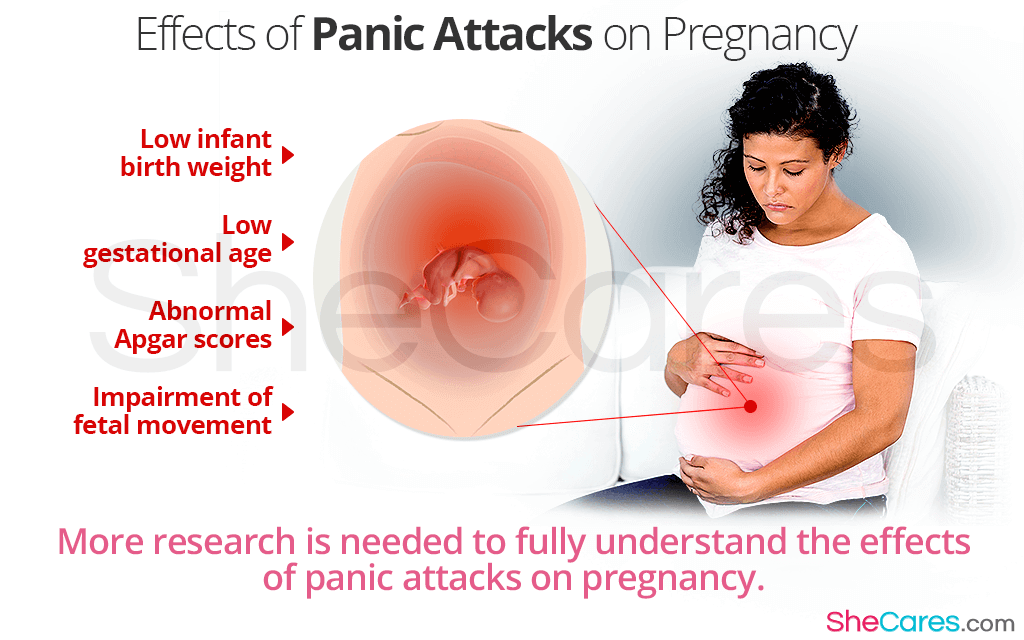Although panic attacks can occur at any time throughout women's life, the majority of them begin in mid-20s and early 30s, which happens to coincide with the reproductive years. While most pregnant women report less severe symptoms during pregnancy, some suffer from exacerbated panic attacks.
Recognizing panic attacks is sometimes quite challenging, because their symptoms, such as an increased heart rate or shortness of breath are a natural occurrence during pregnancy as well. Continue reading to learn more about panic attacks during pregnancy, their causes, and effects.
About Panic Attacks
Panic attacks are sudden episodes of extreme fear and worry along with numerous physical symptoms, such as:
- Difficulty breathing
- Racing heart
- Dizziness
- Headache
- Sweating
- Numbness in the extremities
- Nausea
They usually appear unexpectedly, last up to 10 minutes, and go away on their own.
Causes of Panic Attacks during Pregnancy
Causes of panic attacks during pregnancy are mainly associated with hormonal fluctuations and stress about the well-being of the fetus, as well as the new responsibilities of becoming a parent.
Other general causes of panic attacks might include:
- Other mental health disorders
- Biological malfunction
- Substance abuse
- Genetics
Effects of Pregnancy on Panic Attacks
Numerous studies have shown that women with mild panic attacks usually do not experience drastic changes in their frequency and severity during pregnancy. In fact, many of them even show significant improvements, which is said to be due to the calming effects of progesterone.
However, women who normally suffer from severe panic attacks may notice a worsening of symptoms or a development of new ones. It is believed to be related to the changes a woman's body goes through to accommodate the growing fetus; for example, when the uterus expands, it might put pressure on the diaphragm or lungs, making breathing more difficult, which in turn can cause pregnant women to feel breathless. Shortness of breath might easily be mistaken for an upcoming a panic attack and actually trigger one.
Effects of Panic Attacks on Pregnancy
Although generally harmless in non-pregnant women, there is a small evidence that panic attacks during pregnancy might affect its outcome. Research has shown that untreated anxiety and panic disorders during pregnancy might result in low infant birth weight, low gestational age, abnormal Apgar scores, and impairment of fetal movement.
Panic attacks with agoraphobia, which is a fear of being in certain places that might trigger an attack, has also been linked to decreased nutrition and reduced prenatal care. However, more research is needed to fully understand the effects of panic attacks on pregnancy.
Should I Be Worried?
Panic attacks during pregnancy should be promptly evaluated by a medical doctor to rule out a heart disease, thyroid dysfunction, anemia, or preeclampsia, all of which might produce symptoms similar to those of a panic attack.
When panic disorder co-exists with depression, women might be more vulnerable to suicidal thoughts, in which case a more comprehensive treatment plan should be prescribed as soon as possible.
Research has also indicated that women whose panic attack symptoms did not escalate during pregnancy or who did not experience them at all might suffer from severe attacks during the postpartum period, particularly in the first 12 weeks after delivery. In this special time of many physical and emotional changes, pregnant women need more support and reassurance. If you feel overwhelmed by panic attacks, talk to your doctor right away to help you alleviate the symptoms and ensure that you and your baby remain safe and healthy.

